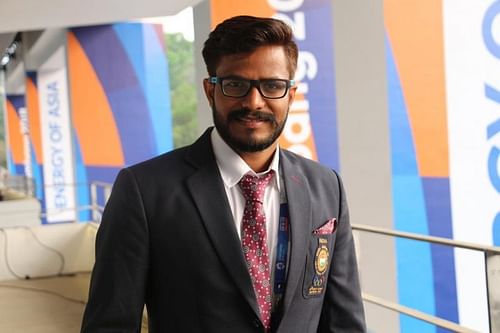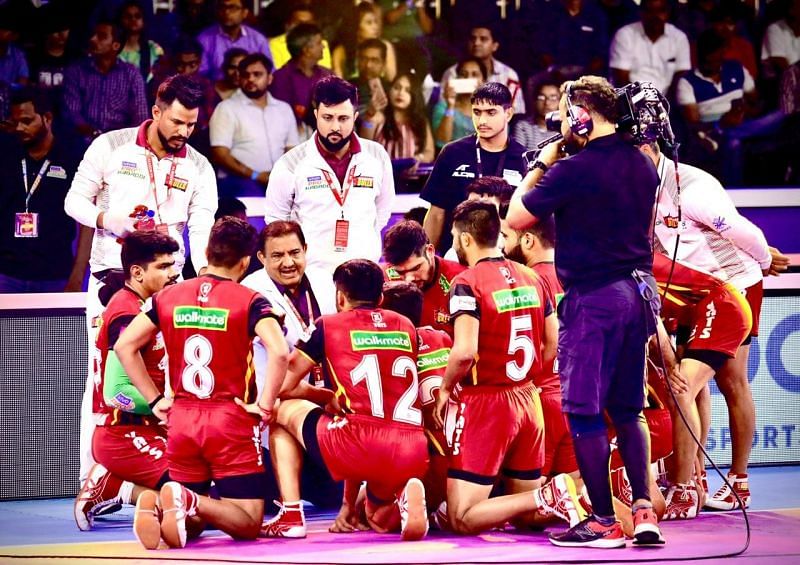
Physiotherapy is a niche field in India but has tremendous potential: Bengaluru Bulls physiotherapist Arvind Yadav

Sport has increasingly become a diversified field full of people who contribute to teams or players in various ways. Players invariably get the plaudits for their performances and very often, the coaches or team managers also earn praise for their work. That is because they are often the most visible personnel in the playing arena.
However, there are people behind the scenes who work with almost as much fervour to ensure that these athletes are able to give their best on the playing field. Sports physiotherapists work very hard every day to ensure that players and athletes under their tutelage are in the best possible physical and mental condition.
To shed more light on the life of a sports physiotherapist, we caught up with Bengaluru Bulls and former North East United FC physiotherapist, Dr. Arvind Yadav. Apart from the Bulls and NEUFC, Dr. Yadav had also been with the Indian Archery team at the 2016 Rio Olympics and the Asian Games.
How important is the role of a physiotherapist for an athlete on a game to game basis?
The role of a physiotherapist for a team is very critical. If there's no coach, there wouldn't be balanced teams. In the same way, if there is no physiotherapist for a team, the team will be deficient somewhere.
If they lack fitness, they will have injury issues. Physios are the ones who take care of everything, from the well-being of athletes, their training and diet, and make a schedule in close association with the coach. They create a balance between the team and its coach.
Every sport places unique demands on athletes. In physical sports like hockey and football, physiotherapists have to work more on players' agility and stamina. For a sport like shooting, a physio need to be tactically knowledgeable.
He/she has to understand the science behind the sport and make the coach understand the optimum training schedule for a particular athlete. In doing so, the physio needs to understand the unique demands and areas of attention, because no two athletes or players have the exact training regimen.
Additionally, the physio has to make sure that athletes do not easily get fatigued or injured. In the event of an injury, the physio has to chart out a recovery schedule and ensure that the injured athlete is not hurried back into action too early.
What was your first experience of working with a top athlete like?
When I first started out, I never thought I would get an opportunity to work with a sports team.
After my graduation, I met a lot of people to look for an avenue of work. There was a person who asked me what would I do if I received an opportunity to work with a sports team.
My initial reaction was one of surprise as I thought he was trying to insult me. But he assured me that he was not joking. He was the faculty in-charge and offered me an opportunity to work with his archery team.
I did not reply immediately. Next week, he called me again for my response, and this time, I tentatively agreed to his proposal. However, I was apprehensive in the beginning because I was unaware of what was in store for me as I never worked with sports teams or athletes before.
I spoke with a few of my friends for advice. Some of them thought that it (the offer to work with the archery team) was some kind of a prank, which I should not take seriously. But a few of them told me that I should not refuse an opportunity where I could learn something new.
Motivated by their encouraging words, I approached my new job with cautious optimism. The first few days were tough, and I used to be nervous about the smallest of mistakes I made, worrying that my career could get over before it started.
However, I started conversing with the athletes and gradually began to enjoy my role. I accompanied the archery team to the Asian Games and the Rio Olympics, which was the most memorable part.

How does a normal day in your life as a sports physiotherapist look like?
No day is a normal day for a physiotherapist because you either have game days, training days or rest days.
For physios, everyday is a busy day. That is the nature of our job. To ensure that the athletes are fit and fine, our day starts early morning before everyone goes to the field and ends at the end of the day after everyone goes off to sleep.
In between, you have to be with the team and need to care about the tiniest of details . That is because you are responsible for almost everything concerning their physical well-being.
In a sport like football, there is a team doctor. But in most other sports, a physiotherapist is the one responsible for the health of athletes. We need to take care of their diet, supplements, recovery, rehab, training and post-training.
If you think of it as a work, you might feel overwhelmed. But if you enjoy what you do, it can be a fabulous experience. On some rare off days when I am not with the team, I miss my work because that has been my routine for the last seven to eight years.
What motivated you to take up this field as a profession, and how did you first start?
I came to this field by accident. I was an engineering student but I couldn't continue beyond the first year as a few things happened in college involving the changing of streams.
Because of that, I had to leave engineering, but I couldn't lose my extra year because of my stupidity. So I thought of doing a one-year course where I could atleast study something. During that year, I did physiotherapy and started enjoying it.
I thought it could be an alternative to engineering. I was also determined to change my behaviour and get serious about life, and fortunately, things worked out for me. You can say, I was a changed person from the day I started studying physiotherapy.
Did you ever want to be an athlete before you decided to be a physiotherapist?
I was good in sports during my college days and school days, but I didn't have anyone to motivate me to become an athlete. Everyone used to say that if I did not study, my life won't be good. I started to focus on my career because if you have a good job, you can do everything.
During my college days, I used to play for my university. So, I had a better knowledge of sports and injuries.
You can know more about sports injuries if you understand the science behind the sport. So whenever I get time, I play sports. In my spare time, I delve deep into a sport and try to understand the basic movements associated with it.
Physiotheraphy is a very unique field and has very different challenges. What are those challenges that you face on a regular basis?
This field is indeed very unique and challenging. You have to go through a lot of stuff everyday because when you're working with professionals from top leagues, you have a very big responsibility.
You are responsibile for about 19 or 20 people. When you're with the national team or with a club, all eyes are on you in the event someone gets injured. You are the person who is asked about the details of the injury and how fast the injuried athlete would get back to action.
It is a difficult role, for which you need to be physically and mentally calm and composed. A physiotherapist is a bridge between the athletes, coach and management.
The role also comes with enormous responsibilities. You are often privy to team strategies which get realigned when key players get injured. So it is imperative to get an injured athlete back to his optimum fitness at the earliest to retain the team's competitive edge.
How has this profession changed you on a personal level? Has it changed the way you think about people?
When you are in this profession, you are responsible for many people. You have to take care of many athletes, which helps you become patient.
The role also requires you to develop good communication skills as need to interact with a lot of people. You start seeing people in a different way and you become a good observer.
What advice would you offer to anyone who wants to take up this profession?
It is a relatively niche field, especially in India, where we are only beginning to get aware about the importance of health and fitness for athletes.
The government has started the Fit India movement to have more fit people, something that is so vital for the sports perspective. Earlier when athletes had pain, they used to visit orthopaedics, now they approach their physios.
In a country of 130 crore people, there are only one lakh physios. So, from that perspective, this field has a lot of potential.